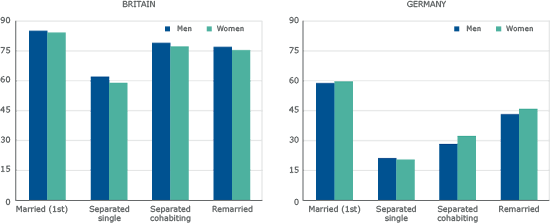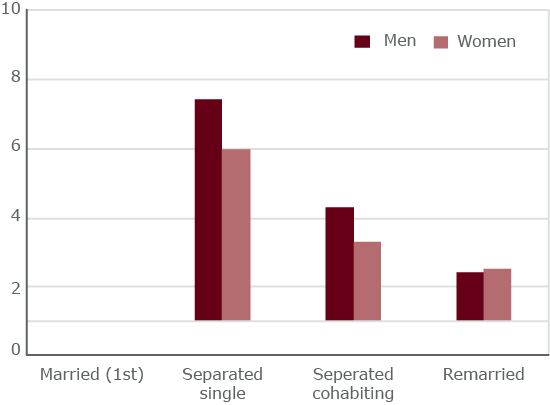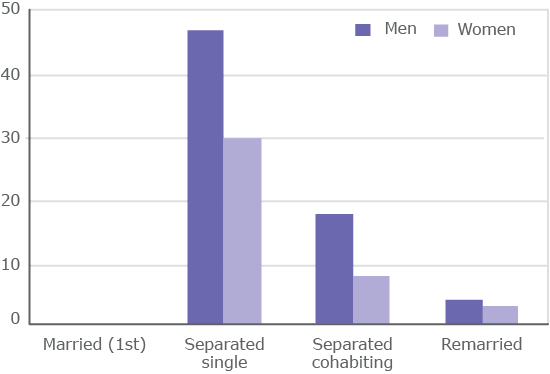Currently a large share of marriages in Europe ends in separation. Marital separation not only causes psychological and emotional stress, but it also affects residential mobility. This occurs because, generally, at least one of the ex-partners leaves the shared dwelling after separation. In this study, Philipp Lersch and Sergi Vidal analyse residential moves to owned and rented dwellings by relationship status and gender, and examine selection processes between ownership and separation in Britain and Germany.
The study confirms that separation is negatively associated with ownership: Home ownership rates are lower among people who have not yet repartnered after separation. Such a situation is a direct consequence of separation and also relates to the lower investment in ownership made by those who eventually end their marriages. Lersch and Vidal found that even if ownership rates increase again after individuals find a new partner, they do not reach the levels of the first marriage. Regarding differences between the two countries, the authors show that ex-partners in Britain maintain higher levels of ownership after separation than ex-partners in Germany that are attributable to housing market characteristics, i.e. a smaller rental sector.
Finding a new partner after separation reduces the risk of moving out of home ownership
Results indicate that people married for the first time have the highest share of home ownership. Nonetheless, there are large differences between countries: More than 80% of women and men in first marriages in Britain are homeowners, compared to about 59% of their counterparts in Germany (Figure 1).
After the first marriage has ended, the level of ownership drops remarkably. Compared with individuals in their first marriages, ownership rates for those not yet repartnered (separated single) decrease by more than 20 percentage points in Britain and by around 40 points in Germany. The ownership rate increases again in subsequent partnership transitions, but it does not reach the home ownership levels of people in their first marriages.
Lersch and Vidal found that ex-partners in Britain and Germany tend to move out of ownership after the end of their first marriage. The odds of British men and women leaving home ownership after the end of their first marriage are about four times higher than they are for those in their first marriage (Figure 2).
The effect of separation after the first marriage on transitions out of ownership is high in Germany and moderate in Britain. In fact, the odds of leaving home ownership are more than 10 times higher for separated German men and women than for those married for the first time. When considering separated singles, the odds are substantially higher. The odds of leaving home ownership are 47 (30) times higher for German men (women) separated singles than for those in their first marriage (Figure 3).
The likelihood of moving out of home ownership for both British and German ex-partners decreases after repartnering (Figures 2 and 3), but the likelihood is always greater than it is for those who are in their first marriages.
Lersch and Vidal found that ex-partners in Britain and Germany tend to move out of ownership after the end of their first marriage. The odds of British men and women leaving home ownership after the end of their first marriage are about four times higher than they are for those in their first marriage (Figure 2).
The effect of separation after the first marriage on transitions out of ownership is high in Germany and moderate in Britain. In fact, the odds of leaving home ownership are more than 10 times higher for separated German men and women than for those married for the first time. When considering separated singles, the odds are substantially higher.

Figure 1. Average ownership rate over partnership trajectory, Britain and Germany.

Figure 2. The effect of partnership states after first marriage on transitions out of ownership (odds ratios) in Britain.
Note: Married (1st) is the reference category.

Figure 3. The effect of partnership states after first marriage on transitions out of ownership (odds ratios) in Germany.
Note: Married (1st) is the reference category.
This Population Digest has been published with financial support from the Progress Programme of the European Union in the framework of the project “Supporting a Partnership for Enhancing Europe’s Capacity to Tackle Demographic and Societal Change”.